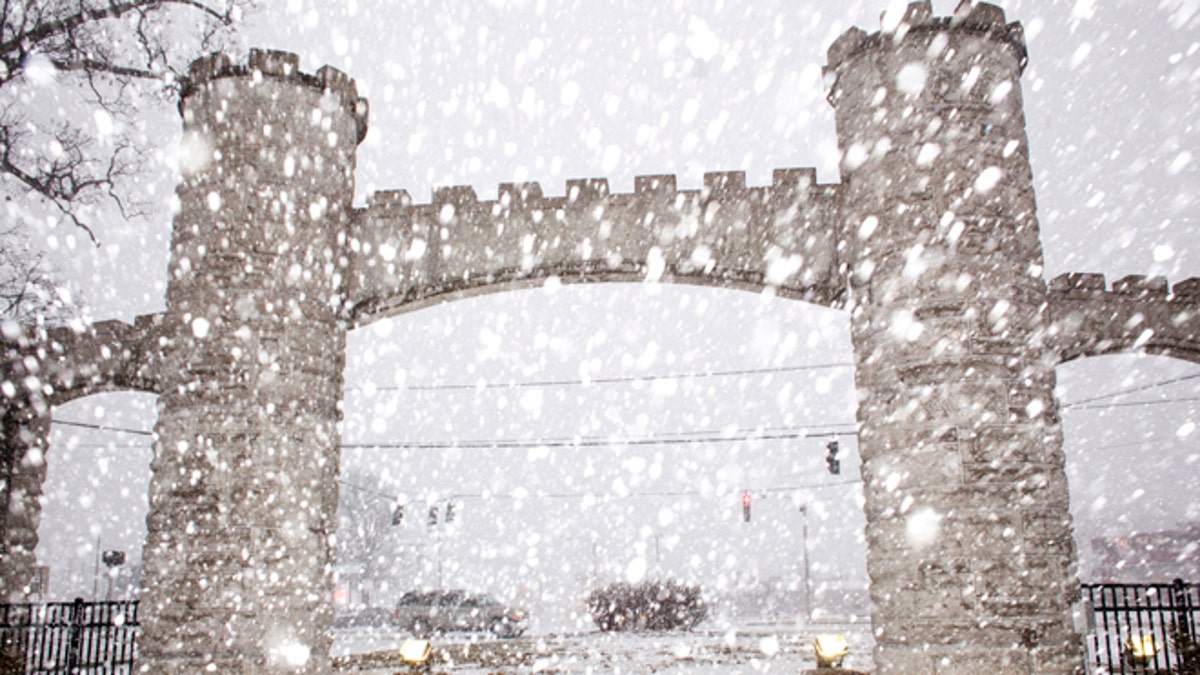
Snow falls near the entrance of Noble Park, Wednesday, March 4, 2015, in Paducah, Ky. A storm stretching from northern Texas to southern New England is set to bring what could be winters last significant snowfall for the East Coast. (AP Photo/The Paducah Sun, John Paul Henry)
Much of the South was forecast to see temperatures drop 30 to 45 degrees in a 24-hour period thanks to yet another arctic cold front, according to the latest forecasts.
Some locations may even see their coldest temperatures ever recorded so late in the season, including Nashville and Louisville, Kentucky, where temperatures may drop into the single digits.
Meanwhile, areas farther north, such as Maryland and New Jersey, were already seeing snow early Thursday and federal workers in the Washington area were told to stay home.
A wintry mix of precipitation fell Wednesday night in Memphis, where a sheet of ice coated the roads, making driving especially hazardous.
Mississippi counties were advised to open shelters powered by generators to give residents an option beyond cold, dark homes in the event of power outages.
Here's a look at what's happening:
___
WASHINGTON FEDERAL WORKERS
The federal government says its offices in the Washington area will be closed Thursday because of a new round of winter weather expected in the region.
The Office of Personnel Management says non-emergency personnel in and around Washington are granted excused absences for the day. Emergency employees and telework-ready employees are expected to work.
___
IS HIGHER FARE FAIR?
With the nation's capital about to be under a snow emergency, cab rides are about to become more expensive.
The D.C. Taxicab Commission announced Wednesday that snow emergency fares will be in effect Thursday from 7 a.m. to 7 p.m. That means cabs can add a $15 surcharge to the metered fare.
The surcharge is meant to entice cab drivers to keep working so people can use cabs as needed.
___
FINISHING A SHOVELING JOB
First responders in Connecticut who tried to save a man's life when he collapsed while shoveling snow off his roof returned to finish the work after he died.
Fire Chief David Billings identified the man as Miroslaw Dabrowski. The 57-year-old Dabrowski suffered a heart attack.
The emergency call came in at 9:45 a.m. Tuesday. Police officer Bernie Hallums said he and other officers climbed to the roof and started cardiopulmonary resuscitation. He was declared dead at Manchester Hospital.
Later that morning, Hallums and other officers and firefighters returned to the house to finish removing snow from the roof.
___
CONGRESS FLEES FLURRIES
The weather forecast got Congress going and produced rare bipartisan agreements in the House and in the Senate to finish business early and get out of town. Up to 8 inches of snow was in the forecast for Thursday morning.
Senate leaders set the last vote of the week for 2:30 p.m. Wednesday. But that wasn't good enough for Republican Sen. James Inhofe of Oklahoma.
"Is there any way you could change that to 2:20 from 2:30?" Inhofe asked on the Senate floor. "There are four people who can't make planes, otherwise."
He was accommodated.
___
LIGHT AT THE END OF THE TUNNEL?
Mike Halpert, deputy director of the National Weather Service's Climate Prediction Center, said the storm "might be winter's last hurrah." Likewise, AccuWeather senior meteorologist Alex Sosnowski said the storm could be winter's "caboose."
After the storm and possibly some cold days into the weekend, the next couple of weeks should be considerably warmer than normal for a large chunk of the country, Halpert said. The Climate Prediction Center predicted, however, colder-than-normal temperatures for New England.
___
ENJOYING A GAME BEFORE WINTER RETURNS
Claire Greer was out enjoying a last few hours of warmth Wednesday afternoon in Starkville, Mississippi, even as cold air, high winds and icy precipitation plunged into parts of Mississippi to her north and west.
Greer was watching Mississippi State University's softball team play Georgia's Kennesaw State University, dreading the moment when the wind would begin blowing from the north and winter would return.
"I'm ready for spring," the Starkville retiree said by telephone. "That's another reason I came out here to watch the girls play, before it gets cold."
___
BEWARE OF PRICE GOUGING
West Virginia Attorney General Patrick Morrisey says the state's price gouging laws are now in place.
The anti-gouging law kicks in any time the governor declares a state of emergency or state or preparedness. Gov. Earl Ray Tomlin declared a state of emergency Thursday and mobilized state resources as a winter storm threatens to dump up to a foot of snow on the state.
The state's anti-gouging laws prohibit any person, business or contractor from inflating the price of a consumer item by more than 10 percent of what it sold for 10 days before a gubernatorial declaration. The law remains in place until the state of emergency or preparedness is lifted.
Consumers who believe they have been price gouged can file a complaint with the Consumer Protection Division.
___
TWO MORE INCHES, PLEASE!
Some Bostonians were clamoring for a little more snow so they can break a record.
So far this winter, the city has received 105.5 inches of snow — more than 8 1/2 feet, the National Weather Service said. The record is 107.6 inches recorded during the 1995-96 season. Records date to 1872.
Having endured weeks of misery, residents like Erin O'Brien insist they deserve bragging rights. Otherwise what was the point of repeatedly digging out?
"I want the record. We earned the record," said O'Brien, a professor of political science at the University of Massachusetts-Boston.
Others don't care about the record. Amy Ouellette, a marketing associate in Salem, north of Boston, just wants spring and sun to come and melt it all away.
